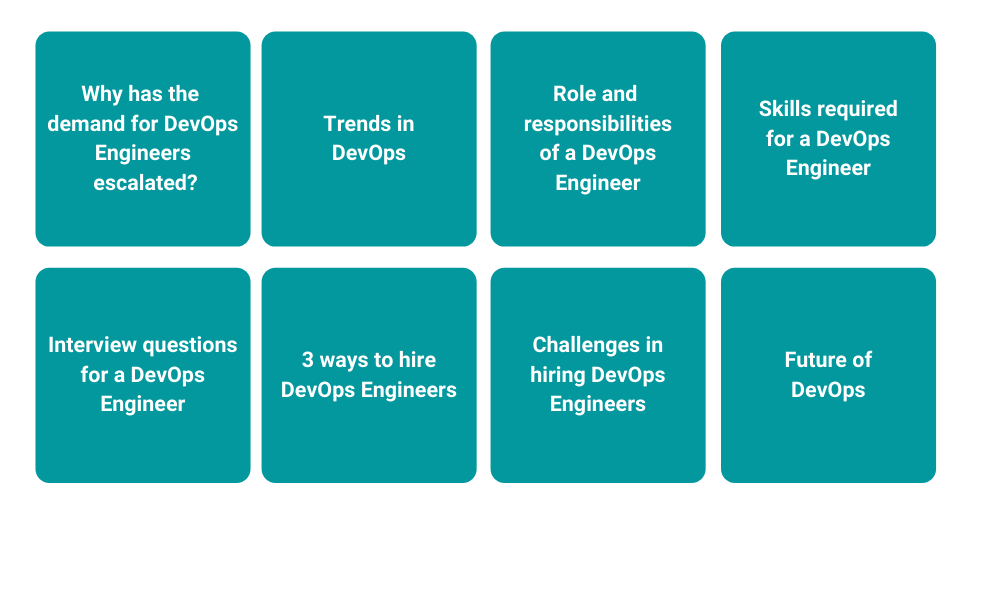
Make talent quality your leading analytic with skills-based hiring solution.

The urge for recruiting DevOps engineers has escalated over the years. According to a report from Google Cloud and Harvard Business Review Analytic Services, two-thirds of companies that use DevOps have seen benefits impacting their bottom line, including increased speed to market (70%), productivity (67%), customer relevance (67%), innovation (66%), and product/service quality (64%).
As more companies are inclined towards hiring DevOps engineers, recruiting them has become more difficult. Questions like how to become a DevOps Engineer in 2022 have become ubiquitous.
According to DevOps Institute’s 2020 Upskilling: Enterprise DevOps Skills research, 58% of respondents say that finding skilled DevOps individuals is a huge challenge, and 48% say the retention of skilled DevOps individuals is a challenge.
Among all the lucrative careers of 2022, DevOps takes one of the top 5 spots.
Keep on reading this blog and find out the following.

With every passing year, the world is getting dependent on IT. Internet of Things is one of the trending topics in 2022. This phenomenon has resulted in the growth in demand for DevOps, persuading companies to be a part of the Agile software revolution. This growth and the need for a new system have escalated the rise of DevOps hiring.
According to a report by Markets and Markets, the DevOps market will have a compound annual growth of 24.9% within 2023. There are plenty of reasons behind the increase in demand for DevOps engineer’s profile.
DevOps is climbing the ladder of progress since its advent and has a long way to go. As per IDC, the DevOps market is expected to reach USD 6.6 Billion by 2022.
Organizations are adopting DevOps fast and thus, employers must be aware of the newest trends in DevOps for better functioning and production.
A DevOps engineer is one who is adept in ‘development’ and ‘operations’. The individual is responsible for helping the various development teams to increase efficiency by providing technical support, ultimately helping the team to manage the application development cycle. They are also responsible to fix errors, provide regular updates, keep by the company’s objectives, and maintain stability.
The responsibilities of DevOps engineers can be narrowed down to the following five:
The role of a DevOps engineer depends on the company’s requirements. The need for a DevOps engineer may arise due to any of these factors:
There are generally six roles regarding DevOps. These are:
Hiring someone for a DevOps role is a tough one. Different focal areas within DevOps encompass a vast array of skill sets. The following are the major areas in the realm of DevOps.
It is necessary to screen the candidates through proper evaluations to identify the skill set based on the focal areas.
Let’s take a closer look at all the important skills that recruiters should look for in the candidates applying for a DevOps role.
Depending on the DevOps role, recruiters need to craft the questions in such a way that they hit the important points while hiring. The questions should be tailored to bring out the skills required.
To help recruiters get a good grip over the interview questions necessary for hiring a DevOps engineer, we have created this list.
Hiring from freelance websites: Hiring a contingent worker for a DevOps role can be beneficial. The following are the advantages of hiring freelancers.
Hiring through recruitment agencies: Recruitment agencies are adept at finding the right candidates based on the requirements of the company. The benefits of hiring through agencies are:
Hiring through outsourcing companies: This process is much convenient compared to the others. The benefits of hiring through these companies are as follows:
It is undeniable that cloud computing has grown so rapidly that it has become difficult to comply with the requirements. The role is so vast that hiring managers cannot create a clear concept of the hiring process. It also creates a peculiar challenge when hiring cross-platform developers.
The DevOps engineers have to be talented and also, possess a great set of skills and experience. The job is too demanding and precise excellence is of top priority. Hence, hiring for the role is so challenging. The prime factors behind the problems associated with hiring DevOps engineers are:
DevOps has a great and promising future. The applications of DevOps are developing each day and DevOps methodologies are changing with new tools and technologies.
The future of DevOps in 2022 can be seen as somewhat of a cultural shift, bringing conventionally disconnected components in the development, deployment, and delivery of software into a single loop. Organizations are finding that DevOps is replacing and improving their indigenous IT departments. The titles, roles, and overall management systems are changing with the development of DevOps and cloud management.
The key to proper execution is successful communication and integration amongst the teams.
The future of DevOps means the reduction of manual approvals and time-taking application process through high-class automation and efficient performance management.

AI-Powered Total Talent Management for Contingent Worker Success With over a decade of experience managing global contingent worker programs, Natalie Javid brings a wealth of knowledge from her work at tech giants like ServiceNow, Airbnb, and her current role as Head of Global Contingent Workforce at Snowflake. Speaking at ProcureCon 2025, Natalie shared insights on […]

Revolutionizing Future Trends with AI in Contingent Workforce Management The Human Touch in an AI-Driven Industry Eric Osterhout brings almost two decades of experience to the contingent workforce management space, currently serving as a Program Leader and Buyer for Contingent Labour at Huntsman Corp. With 17 years on the buyer side and 10 years previously […]

How AI Will Reshape Contingent Workforce Management by 2030 Meet Chris Farmer – Global Head of Contingent Workforce Strategy As the Global Head of Contingent Workforce Strategy and Strategic Sourcing at Salesforce, Chris Farmer leads one of the most complex and forward-thinking CW programs in the industry. Chris has spent over five years at Salesforce, […]